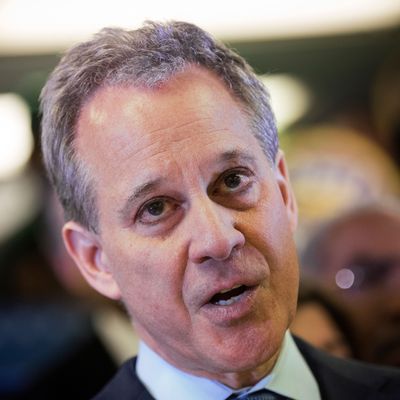
For some stupid reason, the founders of our republic decided to design an immensely complicated constitutional system chock-full of checks and balances — on the theory that it was important to prevent power from becoming concentrated in any one part of the government — and then just gave the head of the Executive branch the absolute, unilateral power to nullify all federal laws by handing out “get out of jail free” cards to anyone he wants.
For most of American history, the insane scope of the pardon power has been kept in check by norms, and the understanding that flagrant abuse of the authority would come at a steep political price. But in the Trump era, those guardrails look rather flimsy. The current president has no reverence for governing norms, and has retained the loyal support of his party’s congressional majorities and voting base while engaging in conspicuously corrupt and unhinged behavior on a near daily basis.
The reality that there is little to stop the president from promiscuously exercising his pardon powers to protect his friends and family has shadowed the investigation into his campaign from the beginning. But the concern has grown more prominent in recent weeks, as Special Counsel Robert Mueller’s probe has enveloped Trump’s longtime fixer Michael Cohen, and reports revealed that the president had floated pardon promises to Michael Flynn and Paul Manafort.
The most important limitation on Trump’s capacity to immunize his allies from the rule of law — whether through pardons or through sabotaging the special counsel’s investigation — is the fact that he cannot directly shield anyone from prosecution for state-level offenses. But even that backstop isn’t as robust as it appears on first glance: Many states, including New York, have double-jeopardy laws that prevent people from being prosecuted a second time for crimes related to the same act — even if the initial prosecution was brought for a federal offense.
The upshot of that: If Trump pardoned Paul Manafort for a money-laundering charge brought by the special counsel, New York prosecutors would be powerless to prosecute him for analogous offenses against the Empire State.
But New York Attorney General Eric Schneiderman wants to change that. As the New York Times reports:
Attorney General Eric T. Schneiderman of New York is moving to change New York state law so that he and other local prosecutors would have the power to bring criminal charges against aides to President Trump who have been pardoned, according to a letter Mr. Schneiderman sent to the governor and state lawmakers on Wednesday.
The move, if approved by Gov. Andrew M. Cuomo and the Legislature, would serve notice that the legal troubles of the president and his aides may continue without the efforts of Robert S. Mueller III, the special counsel investigating possible Russian interference in the 2016 presidential election.
Under the plan, Mr. Schneiderman, a Democrat, seeks to exempt New York’s double jeopardy law from cases involving presidential pardons, according to the letter, a copy of which was obtained by The New York Times. The current law and the concept of double jeopardy in general mean that a person cannot be tried for the same crime twice.
The constitutionality of Schneiderman’s proposal is certain to be a matter of debate. But New York’s double-jeopardy law already includes certain caveats. So the attorney general is not proposing the elimination of an absolute protection, but merely to add one more exception to the rule.
“New York’s statutory protections could result in the unintended and unjust consequence of insulating someone pardoned for serious federal crimes from subsequent prosecution for state crimes,” Schneiderman wrote in his letter to lawmakers, “even if that person was never tried or convicted in federal court, and never served a single day in federal prison.”
The prospects of Schneiderman’s proposal aren’t immediately clear. While New York is a deep-blue state, its Senate is narrowly divided between Democrats and Republicans.






























